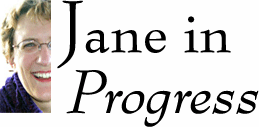 |
|
 |
 |
Looking for tips and tricks to the art of writing for television? Welcome to the blog of experienced television writer Jane Espenson. Check it out regularly to learn about spec scripts, writing dos and don'ts, and what Jane had for lunch! (RSS:  ) |
|
|
Home » Archives » April 2010 » Novelists vs. Journalists
[Previous entry: "Do I Still Remember How to do This?"] [Next entry: "Go with the Flo"]
04/10/2010: Novelists vs. Journalists
I'm doing a lot of reading about old Hollywood right now, with particular emphasis on the transition from silent films to talkies. Oh, this is such good stuff, you have no idea.
The screenplays for silent movies obviously were about action and mood and intention instead of dialogue. I'm not talking about the dialogue that appeared on title cards, but the scenario for what happened in the film. The skills of a novelist were very appropriate for this kind of screenplay writing, which was descriptive, evocative, and internal. By "internal" I mean that it was concerned with what the character was thinking and feeling.
When the arrival of Talkies necessitated the writing of massive amounts of dialogue, new writers were hired, usually brought in from the East Coast. Novelists and journalists were both hired and given the chance to try their hands at this new kind of screenwriting.
So who thrived and who didn't?
The journalists won. They had an ear for naturalistic dialogue and they knew how to write concisely and tell stories with clear-eyed details, not evocative prose. The novelists tended to write longer and more stylish (or stylized) speeches and descriptions. Beautiful stuff, but not as valuable as something short and potent.
Three of my colleagues in the writers' room at Battlestar Galactica were former journalists. That's about half the room. They were some of the finest writers I've met in the business. It looks to me like the skills still mesh.
I'm obviously not telling you to go out and find a newspaper to write for -- that doesn't seem like a particularly easy assignment right now. But I still think this information is useful for all you aspiring writers. Think like a reporter -- pare the story down, find the bones of it, and listen to your characters talk in the language of whatever street they come from -- even if you let them ramble on a bit in the first draft, eventually try to find the succinct quote.
You get to make up the facts and the people, but the core truths that you're uncovering should be just as real as if the story had happened. Be a reporter.
Lunch: Wheat Thins and cheese today. But I went to "Street" the other day, Susan Feniger's restaurant, and it's amazing. I was not surprised to see her do well on Top Chef Masters this week. Try the "Kaya Toast".
|
|
|
 |
|
Get Blog Updates Via Email
|
|
 |

